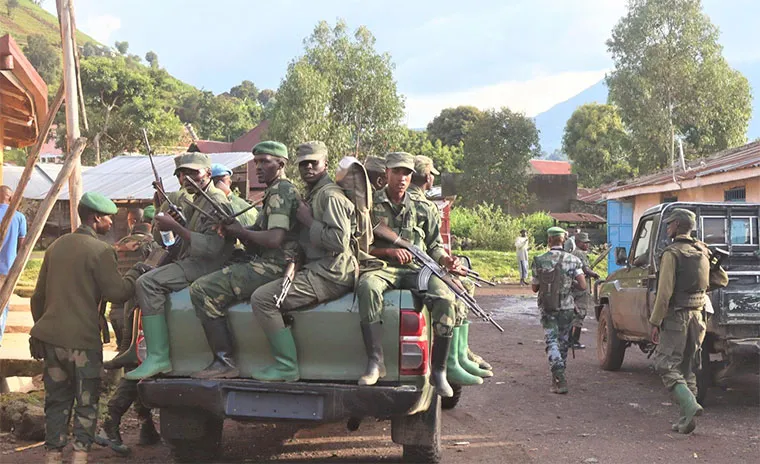Rebels from the M23 movement have announced they have taken control of Goma, a major city in the eastern Democratic Republic of Congo (DRC).
This follows a rapid advance against the Congolese army on Sunday, which forced tens of thousands of people to flee neighboring towns.
Residents shared videos showing M23 fighters patrolling Goma’s main streets.
After hours of intense gunfire and explosions, the city—home to over a million people—is now reportedly quiet, according to local media.
Regional Tensions Escalate
The takeover comes amid escalating tensions between the DRC and Rwanda. The DRC’s foreign minister has accused Rwanda of declaring war by sending troops across the border to support the M23 rebels.
Rwanda, however, denies these claims and accuses Kinshasa of supporting militias seeking regime change in Kigali.
Kenya has called for an immediate ceasefire and announced that the presidents of both the DRC and Rwanda will attend an emergency regional summit within the next two days.
Kenyan President William Ruto, the current chair of the East African Community, emphasized the need for regional leaders to facilitate a peaceful resolution to the conflict.
Humanitarian Crisis Deepens
The M23 group has controlled large parts of the mineral-rich eastern DRC since 2021. In recent weeks, the rebels have advanced swiftly toward Goma, displacing over 400,000 people in North and South Kivu provinces since the start of 2025, according to the UN’s refugee agency.
One displaced woman, Alice Feza, expressed her despair after fleeing multiple towns, including Kiwanja, Rutshuru, and Kibumba, only to find herself displaced again in Goma.
“People are fleeing everywhere, and we don’t know where to go anymore,” she said. “The war catches us here among the host families, now we have nowhere to go.”
Key roads around Goma are blocked, and the city’s airport is no longer operational for evacuation or humanitarian efforts, the UN reported.
International Calls for De-escalation
UN Secretary-General António Guterres has called on Rwanda to withdraw its forces from the DRC and urged the M23 rebels to halt their advance.
In a statement, Guterres demanded that Rwanda “cease support to the M23 and withdraw from DRC territory” and called on the rebels to “immediately cease all hostile actions and withdraw from occupied areas.”
This appeal follows the deaths of 13 peacekeepers in clashes with the rebels. The UK has condemned attacks on peacekeepers, while France’s UN representative, Nicolas de Rivière, echoed Guterres’ call for Rwanda to withdraw its troops.
Rwanda’s Response
Both the DRC and the UN accuse Rwanda of backing the M23 rebels. While Rwanda has not explicitly denied these allegations, its leaders blame the DRC for the ongoing conflict.
At a UN Security Council meeting, Rwanda’s representative, Ernest Rwamucyo, criticized the international community for condemning the M23 instead of the Congolese army, which he claimed had violated a ceasefire.
Background of the M23 Rebellion
The M23 group emerged in 2012 as an offshoot of another rebel group, claiming to protect the Tutsi population in eastern DRC, which has long faced persecution and discrimination.
Rwanda has previously accused Congolese authorities of collaborating with individuals responsible for the 1994 Rwandan genocide against ethnic Tutsis and moderate Hutus.
However, critics accuse Rwanda of using the M23 to exploit the DRC’s mineral wealth, including gold, cobalt, and tantalum.
UN Withdraws Non-Essential Staff
In response to the escalating violence, the UN announced on Saturday that it would withdraw all non-essential staff from Goma. Essential operations, however, will continue in the DRC as the international community seeks to address the crisis.

